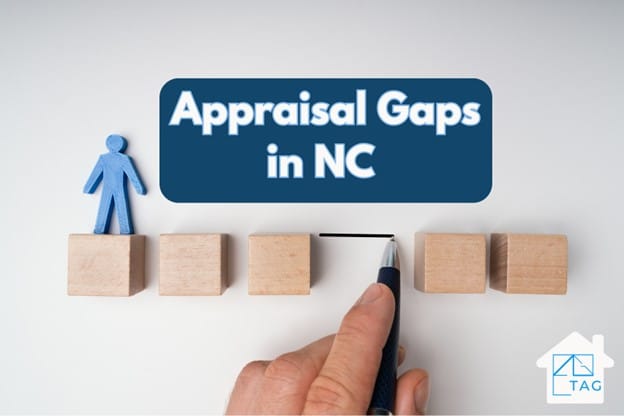How Does an Appraisal Gap Work in NC? TAG is Your Guide!

Navigating the real estate market can feel like a rollercoaster ride. There can be exciting highs, nerve-wracking lows, and sometimes, a few surprises you didn’t see coming.
One such surprise could be the appraisal gap—a term that’s been buzzing around North Carolina’s real estate scene more frequently than we’d like. But don’t worry, we at Triangle Appraisal Group (TAG) are here to break it down for you and share some of our experiences. We hope to guide you with a bit of our own insight sprinkled in.
What is an Appraisal Gap?
An appraisal gap happens when a property is valued lower than the price agreed upon by the buyer and seller. This can cause problems in getting a loan because lenders usually look at the appraised value, not the sale price.
What is Appraisal Gap Coverage?
Appraisal gap coverage is your financial safety net in these situations. You can include an escalation clause in your offer. This clause indicates that you are willing to pay more if the appraisal comes in lower than anticipated. The escalation clause sets a limit on how much extra you are willing to pay. This can be a win-win for both buyers and sellers, ensuring the deal doesn’t fall through over valuation concerns. For a deeper understanding of how this works and its potential impact, you might find it useful to read this article on appraisal gap clauses.

Does Appraisal Gap Go Towards Down Payment?
Essentially, if you’re covering an appraisal gap, you’re bringing additional cash to the table to make up the difference between the appraised value and the purchase price. This extra amount doesn’t directly increase your down payment but does increase your overall cash contribution to the purchase. It’s a crucial distinction because it affects your loan-to-value ratio and, potentially, your mortgage terms.
The Consequences of Appraisal Gaps
When faced with an appraisal gap, the stakes can suddenly get higher for both parties involved. For buyers, this often means dipping deeper into their pockets than anticipated. It’s not just about having to fork over more cash; it can also mean reevaluating your budget and potentially facing higher mortgage rates or PMI if your loan-to- value ratio shifts unfavorably.
Sellers, on the flip side, might find themselves back at the negotiating table, possibly having to lower the sale price to keep the deal alive. In some cases, especially in a buyer’s market, a low appraisal can lead to the painful decision to pull the property off the market altogether if a satisfactory agreement can’t be reached. Such scenarios underscore the importance of realistic pricing and the willingness to adapt to the findings of an appraisal.
Strategies to Navigate Appraisal Gaps for Buyers
Navigating appraisal gaps requires foresight and flexibility. Adding an appraisal guarantee clause to your offer is more than just a gesture of good faith; it’s a strategic move that can make your bid more attractive to sellers in a competitive market. This clause signals to the seller that you’re committed to the purchase and willing to address any gaps between the sale price and the appraised value.
But here’s a TAG tip: always do your homework. Understand the market and the property you’re interested in. If you’re looking for more detailed insights, consider checking out this guide on appraisal gaps that can further equip you with knowledge.
If an appraisal gap seems likely, plan how you’ll cover it. Will you renegotiate the price, or do you have enough savings to bridge the gap? Maybe you’ll explore a combination of both. Whatever your strategy, clear communication with your lender and real estate agent is key to navigating these waters smoothly.

Tips for Sellers to Minimize Appraisal Gap Risks
Sellers can take proactive steps to mitigate the risk of appraisal gaps derailing their deals. First and foremost, accurate pricing is paramount. This isn’t about setting your price based on what you hope to get or what your neighbor sold their house for last year; it’s about a realistic assessment of your home’s value in the current market.
But there’s more to it than just a number. Preparing your home for appraisal is crucial. Ensure that all aspects of your property are in the best possible condition and highlight any improvements or unique features that could positively influence its appraised value.
Consider a pre-listing appraisal from a reputable firm like TAG to gain a clear understanding of your home’s worth and to set a price that reflects its true market value. This can not only speed up the selling process but also minimize the chances of facing an appraisal gap.
Finally, be open to negotiation. If an appraisal comes in lower than expected, being flexible and willing to work with the buyer can make all the difference. Whether it’s adjusting the sale price, agreeing to split the difference, or finding creative financial solutions, the goal is to keep the transaction moving forward to a successful close.
Appraisal Gap Examples
Let’s share a story. A while back, we worked with a seller in Raleigh who faced a significant appraisal gap. The buyer added an appraisal guarantee clause, agreeing to cover up to $10,000 of any gap. The appraisal came in $8,000 lower than the offer price, but thanks to that clause, the deal closed smoothly.
Both parties walked away happy, and it was a perfect example of how appraisal gaps work and how to navigate them. Let’s take a look at some other personal scenarios we have run into:
Example 1: The Durham Duplex
In Durham, we encountered a duplex where the appraisal fell short by $15,000. The buyers were really set on the property and proposed covering the entire gap with their savings. Their willingness to bridge the gap with an appraisal guarantee clause allowed the transaction to proceed smoothly, showcasing the effectiveness of having a financial cushion when navigating the real estate market.
Example 2: The Chapel Hill Charm
A charming property in Chapel Hill was appraised at $20,000 less than its sale price, putting the deal in jeopardy. However, the sellers were proactive; they offered to split the difference and lowered their price by $10,000, while the buyers covered the remaining $10,000. This compromise demonstrated how flexibility and cooperation from both parties can overcome appraisal gap challenges.
Example 3: The Cary Conundrum
A buyer in Cary was faced with a $12,000 appraisal gap on their dream home. Fortunately, they had negotiated an appraisal gap clause in their contract, which required them to cover any gap up to $15,000. Their preparation and foresight ensured the sale proceeded without a hitch, emphasizing the value of strategic planning in real estate transactions.
These examples from our experiences at TAG highlight the variety of ways appraisal gaps can be addressed. Whether through buyer preparation, seller flexibility, or mutual negotiation, there are strategies to navigate these hurdles and achieve a successful real estate transaction

The Role of Professional Appraisers
Understanding the value of your home or potential home is crucial, and that’s where a professional appraisal comes in. We at TAG pride ourselves on accurate, fair appraisals that reflect the true value of your property. We’ve seen firsthand how appraisal gaps work and the difference a good appraisal can make in closing a deal.
Appraisal Gaps, Explained
Appraisal gaps don’t have to be deal-breakers. With the right strategies, like the appraisal guarantee clause and appraisal gap coverage, and a bit of preparation, you can navigate these waters smoothly. At Triangle Appraisal Group, we’re here to help you understand the value of your home and find your way through the complexities of the real estate market.
Remember, every challenge is an opportunity in disguise. Whether you’re a buyer or a seller in North Carolina, understanding and preparing for appraisal gaps can make all the difference. And when in doubt, we’re just a call away!


Peter Bimonte
Extremely flexible…On time, thorough and knowledgeable…I would recommend them for your next home appraisal without hesitation…5 Stars!
Peter Bimonte

Duwayne Evans
I can’t explain how thankful I am to have a such a wonderful appraisal company at my fingertips. They’re very professional and have fast response times.
Duwayne Evans

Maurice Ellis
I’m very pleased with the way Triangle Appraisal Group conducted business me Kevin was very professional explaining the process and walking me through everything
GREAT JOB. THANKS
Maurice Ellis

D
In working Vicki and Amber, we were extremely pleased with not only how quickly our home + property appraisal was scheduled, but with how professionally the entire process was completed. And, it only took 2 business days for the appraisal to be created and sent to us.
I would highly recommend Triangle Appraisal Group to anyone seeking an experienced team for this service!
D

Stephanie Howard
From the minute, I called Triangle Appraisers to the day I received the appraisal report, I was extremely impressed! Vickie responded immediately to every question or request. This was the easiest most efficient transaction I have had with a business in years! I highly recommend this firm for any of your real estate needs!
Stephanie Howard

Alexandra Saywell-Wade
Triangle Apprasial Group was amazing to work with . They’re so knowledgeable of the housing Apprasial process, housing market. They are quick to reach out to you and have great customer service , punctual and give you a very Detailed report. I recommend them to anyone who needs an appraisal.
Alexandra Saywell-Wade

William Reid
This company was very prompt in answering my online request. Their evaluator was very respectful of our property. Very professional from start to end.
William Reid

Alyssa Baker
TAG has been so helpful and friendly ever step of the way. The appraiser was prompt and courteous. I would absolutely recommend!
Alyssa Baker

Deborah Jordan
They are professional putting the needs of customer first. Taking the time to listen, help you work through struggles. They also work in a timely manner. This is the best deal for meeting your needs. I am a valued customer.
Deborah Jordan

May Love
Outstanding appraisal experience. Expertise and timeliness exceeded expectations. Incredibly accommodating appraiser! Went the extra mile for my rent analysis as well. Impressive service. Thank you Matthew, Vicki and TAG!
May Love
FAQs
Appraisal gap coverage involves an agreement where the buyer commits to covering the difference if the appraised value of a home is less than the purchase price. Typically, this is structured through an appraisal gap clause in the purchase agreement, stating how much the buyer is willing to cover. This strategy ensures that the financing goes through even if the appraisal falls short, providing a safety net for both the buyer and the seller.
Appraisal gaps can be beneficial in a competitive housing market where bidding wars push home prices above their appraised values. By agreeing to cover any appraisal gap, buyers can make their offers more attractive to sellers, increasing the likelihood of securing the home. However, it’s important to assess financial stability and market conditions, as this commitment could lead to overpaying relative to market value.
If you’re unable to cover an appraisal gap, the deal may fall through unless alternative arrangements are made. Options include renegotiating the sale price with the seller, seeking additional funding, or the seller lowering the price to match the appraised value. Without a resolution, buyers may need to withdraw their offer, potentially losing the home and any earnest money deposited.
A $5,000 appraisal gap means that there is a $5,000 difference between the offer price for a home and its lower appraised value. If a buyer includes a clause in their offer to cover this gap, they agree to pay an additional $5,000 out of pocket, over and above their mortgage financing, to meet the agreed sale price. This ensures that the financing and sale can proceed even though the appraisal does not support the full sales price.

